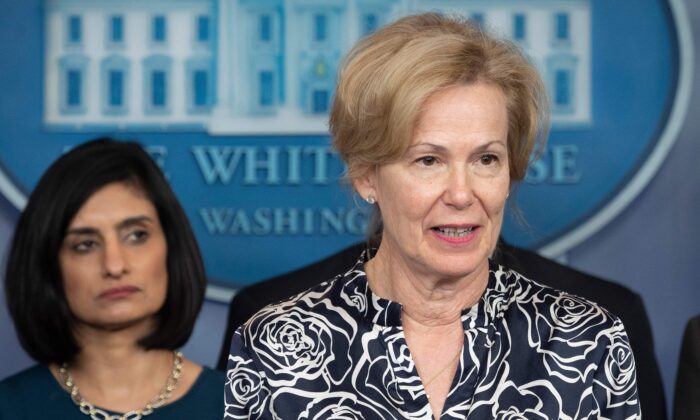WASHINGTON—The United States will begin to see a “spike” in the number of confirmed cases of COVID-19 as the nation ramps up its testing capacity this week, the White House coronavirus response coordinator warned on March 15.
“So you will notice, as these tests roll out over this next week, we will have a spike in our curve,” Dr. Deborah Birx said at a press briefing by the White House Coronavirus Task Force.
“For those of you who watched China and China reporting, remember when they changed their definition and all of a sudden there was a blip in their curve? We are going to see that. We are going to see a spike as more and more people have access.”
Birx who joined Trump’s coronavirus task force in late February said that in the last two weeks the task force has been working closely with commercial labs to ensure that these labs could step in and provide a much higher volume of testing.
U.S. officials have so far recorded nearly 3,800 cases and 69 deaths throughout the country. Globally more than 170,000 are infected and thousands have died.
The states of Washington, New York, California, and Florida have been some of the worst affected by the virus.
2,000 Labs Come Online
Speaking at the press briefing, Vice President Mike Pence, who leads the coronavirus task force, said state labs and CDC have been using manual tests that allow for 40 to 60 tests a day.
However, he said, with the inclusion of commercial labs, the public-private partnership would bring “the high-throughput testing for coronavirus available in real time.”
Pence said that the FDA already approved high-throughput coronavirus testing for Roche and Thermo Fisher, which would allow more than 2,000 labs across the country to have the testing equipment and begin conducting tests rapidly.
In addition, more than 10 states, including New York, Colorado, Delaware, Washington, and Texas have implemented their own drive-through testing sites where people can get tested.
Most of these sites are using the current manual CDC testing, Pence said, but the new testing regimen will be available soon for these places.
The president declared a national emergency on March 13 to curb the spread of the coronavirus pandemic in the country. The action provides up to $50 billion in disaster relief funds to state and local governments to respond to the outbreak.
Following the declaration of emergency, community-based testing sites outside of usual healthcare facilities will be formed in all 50 states, Pence said.
Speaking at the press briefing, Admiral Brett Giroir, the Assistant Secretary for Health and head of the Public Health Service said some states are rolling out their own community-based testing.
“They need to be augmented. We believe we’ve created a model, based on the Public Health and the FEMA system, that is optimized, that can be used for drive-through or potentially walk-through,” he said.
According to Giroir, each of “these pod-based units” can screen between 2,000 and 4,000 people a day for testing.
Red Tape
Overregulation of diagnostic testing has played a major role in delaying the U.S. response to the coronavirus outbreak, according to experts.
The Food and Drug Administration (FDA) has an Emergency Use Authorization (EUA) testing protocol through which it clears tests from labs around the country for use in emergency cases such as outbreaks.
Health experts claimed that in the past outbreaks, EUAs were granted very rapidly. However, this time, the red tape made it so complicated that it took weeks to receive the authorization from the FDA, they said.
“The speed of this virus versus the speed of the FDA and the EUA process is mismatched,” Alex Greninger, the assistant director of the virology division at the University of Washington Medical Center, told the Atlantic.
Roger Klein, a physician, attorney, and health policy expert, echoed the same concern about red tape.
The Food and Drug Administration got “more assertive” during the Obama administration and tried to get control over clinical laboratory testing, he told The Epoch Times.
The Trump administration has taken the right step in providing regulatory relief. However, there is an ongoing legal debate over whether the FDA should regulate lab-developed tests or not.
“In my view, the hospital laboratories shouldn’t need to apply for EUAs,” Klein said.
“The FDA needs to step aside and let the hospital laboratory go ahead. These are very skilled professionals who know how to set up lab tests and they need to leave them alone.”
Isabel van Brugen contributed to this report.
This article is from the Internet:White House Official Warns Cases Will ‘Spike’ As Coronavirus Testing Ramps Up
Rapid Response COVID-19 Science Conducted by Father-Daughter Virologists
